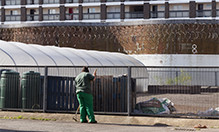High rate of `women in prison` shows over-reliance on remand system, trust report warns
Scotland is still jailing too many women, especially for counter-productive short sentences, reformers claim.
Scotland is still jailing too many women, especially for counter-productive short sentences, reformers claim.
The country has one of the highest rates of female imprisonment in northern Europe, a new report published on International Women`s Day (March 8) reveals.
The study by the Prison Reform Trust (PRT) found that for every 100,000 women in Scotland, seven are held in prison, which is more than double the rate in France (3.3 per 100,000).
Jails in England and Wales currently house 3,958 female prisoners a 6.7 per cent rate per 100,000 head of population. The figure represents 4.6 per cent of the total prison population.
As of last week, there were 333 women behind bars north of the Border, 77 of them on remand. That marks a drop from an average figure of 383 in 2015, but remains far higher than at the turn of the century.
The PRT report said an over-reliance on remand, and on short custodial sentences, was drawing too many women into the jail system.
Justice Secretary Michael Matheson has announced plans for new local jails for women and is trying to cut the prison population.
Yvonne Donald, PRT Scotland and Northern Ireland programme manager, said: Scotland is leading the way in making positive changes for women in the criminal justice system.
The introduction of womens criminal justice centres, and services where women receive support to tackle their offending behaviour, along with the issues that cause it, are an important step in achieving the Scottish Governments goal to reduce the number of women in prison.
However, as our report shows, Scotland still has a long way to go.
While reforms to the womens prison estate are welcome, we must not lose sight that the services women need to turn their lives around often lie outside prison walls.
The trust used numbers from a previous report published by the Scottish Government in 2015 comparing Scotlands female prison population with those of other countries.
The female incarceration rate per 100,000 in that year was 3.3 in France, 4.6 in Germany and 4.2 per 100,000 in Norway. Englands figure came close to Scotlands. Spains was higher.
Reformers stressed that high jail numbers are new. Scotlands incarceration rate was as low as four per 100,000 for women in 2000.
Nearly five years since the publication of the Commission on Women Offenders in Scotlands final report, chaired by Dame Elish Angiolini, many women in trouble with the law continue to be sentenced to short periods in prison.
More than three-quarters (77 per cent) of women sentenced to custody in 2015/16 were given six months or less.
However, speaking in 2015, Scottish Justice Secretary Michael Matheson said short sentences do nothing to stop reoffending in our communities and only result in offenders going in and out of prison time and time again and reoffending upon release.
An over reliance on remand, and on short custodial sentences which fail to tackle the underlying causes of offending, continues to draw women into the criminal justice system and keep them there.
Nearly a quarter (23 per cent) of women in prison are held on remand, compared with 15 per cent of the male prison population. For women that go on to serve a custodial sentence, their reoffending rate remains high, with nearly half (45 per cent) being reconvicted within a year of release.
Rather than helping to turn womens lives around, imprisonment can often compound problems, with more than a quarter (28 per cent) of women losing their tenancy when entering prison, and a third of women, the report found.
Campaigners with backing from HM Inspector of Prisons for Scotland want to see an end to such short sentences.
However, the trust feels that recent proposals by the Scottish Government offer “some hope for change”, adding: “Following consultation last year, an extension of the current presumption against short custodial sentences of three months may be introduced.
“An extension could have a dramatic effect on the number women being sent to prison


